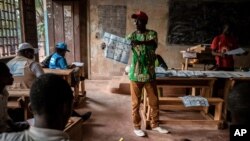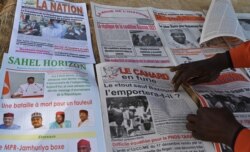Recent violence in Mali, Niger and the Central African Republic have left hundreds dead in recent weeks. But the United States’ envoy to the Sahel region says there is hope in the West African region, as several nations have recently held peaceful polls, with more elections to come in 2021.
The top U.S. envoy to Africa’s Sahel region acknowledges that it has been a rough few weeks in the sprawling desert region -- which covers the West African nations of Burkina Faso, Chad, Mali, Mauritania and Niger.
The region is beset by a wave of deadly violence from extremist groups, with more than 1,000 violent incidents in the first half of 2020, according to a report from the Armed Conflict Location & Event Data Project.
Most recently, in western Niger, extremists attacked three villages on January 2, killing more than 100 civilians. Peter Pham, the U.S. special envoy to the Sahel, strongly condemned the attacks in a call to journalists this week, calling the perpetrators “cowardly” and “godless.”
But he quickly added there is cause for hope, as Niger heads to a second round of presidential elections in February.
“We have congratulated the people of Niger who exercised their democratic right to vote in their presidential and legislative elections on December 27th and look forward to observing an equally successful run-off presidential election process on February 21st. These elections hold the promise of Niger’s historic first peaceful transition of power from one democratically elected president to another,” he said.
It’s no accident, Pham told journalists, that he mentions elections and instability in the same breath. That’s because he contends that these outbreaks of violence across the region have one common cause.
“The heart of the crisis in the Sahel, as I’ve repeatedly emphasized, is one of state legitimacy – whether or not citizens perceive that their government is legitimate, equitable, able, and willing to meet their needs. This includes ensuring justice and accountability for human rights violations and abuses committed by security forces. Absent Sahelian government actions that demonstrate this commitment, no degree of international engagement is likely to succeed,” he said.
That’s why, he added, the majority of U.S. government assistance to the region comes in the form of health, development, and humanitarian assistance. The U.S. has invested over $1.5 billion in those sectors from 2017 to 2109. In that same time period, he said, the U.S. provided about $467 million in security assistance.
Ornella Moderan, a researcher who heads the Sahel program for the Institute for Security Studies, agrees on the importance of state legitimacy. She pointed to Mali, which had a coup in August because of this very lack of confidence in the state.
But, she said, to truly build legitimate governments, societies have to come together voluntarily and have genuinely inclusive dialogue. She spoke to VOA via Skype from Bamako, Mali.
“Now, the question I think is: to what extent can external actors like the U.S. actually support this and accompany this? There is a need for national ownership and there's a need for dialogue really, between ruling elites and the common man … This is really the root cause of where we are right now, so it's important that while we're trying to reestablish a public dialogue, a national dialogue, that we make sure that everyone is included, and this means making sure that no ethnic groups are sidelined, no religious groups, no gender groups. And this is of course very challenging, but very important,” she said.
Is that happening? Maybe, said Pham, pointing to recent presidential elections in Ghana and Burkina Faso, where both incumbents were re-elected.
Pham was sent to both inaugurations because the Ghanaian inauguration is Jan. 7 as part of a U.S. presidential delegation. In both polls, the opposition cried foul -- though the results were nevertheless certified -- and both presidents have vowed to work for all citizens.





